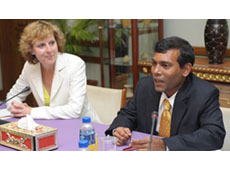The Maldives government and its international partners today announced the launch of three projects under the World Bank administered Maldives Climate Change Trust Fund (CCTF).
A total of US$8.5million has been contributed by Australian Agency for International Development (AusAID) and the European Union (EU) to the CCTF to assist with these projects.
The CCTF was established in 2010 after the signing of an MOU between the Maldives government, the World Bank Group and the EU with the aim of targeting solid waste management, capacity building for environmental management, and technical assistance for monitoring and managing key natural assets.
The projects announced today included the Ari Atoll Solid Waste Management Pilot (AASWM) and a project called Wetlands Conservation and Coral Reef Monitoring for Adaptation to Climate Change (WCCM).
AASWM will assist in reducing greenhouse gas emissions and damage done to the local marine environment in the western atoll.
“The success of the pilot project is expected to bring about the participation of the remaining inhabited islands of Ari Atoll, particularly those where IWMCs were built with prior funding from EU”, said Bernard Savage, EU’s Ambassador to the Maldives.
Australia’s new High Commissioner to the Maldives, Robyn Mudie described the benefits of the WCCM scheme.
“Sustaining wetlands and coral reefs is a cost-effective strategy for climate change adaptation with strong benefits for disaster mitigation, ecosystem conservation and economic growth”, she said.
The WCCM will work with resorts in North and South Male’ atolls to demonstrate the way in which monitoring techniques can help in targeting conservation efforts.
“The WCCM being implemented in Fuvahmulah of Gnaviyani Atoll, Hithadhoo of Addu Atoll and Alif Alif Ukulhas Island in North Ari Atoll will benefit its 22,000 inhabitants enabling the local governments to implement a clear strategy for wetland management, drainage management, ecotourism and community rainwater harvesting,” read today’s joint press release.
“These three projects will be particularly useful in the context of the decentralized governance framework and public private partnerships. Once piloted and proven successful, the models could be scaled-up and replicated across the country,” it added.
The final project announced today will attempt to provide an annual 300MWh of renewable energy via solar voltaic systems and energy efficiency measures for the people of Thinadhoo Island in the Gaafu Dhaalu Atoll.
“Independence from carbon-based fuels, if achieved through energy efficiency improvements and use of indigenous renewable energy resources has important energy security co-benefits as it will avoid fossil fuel imports that cost Maldives 20 percent of its GDP, annually”, said Dr. Mariyam Shakeela, Minister of Environment and Energy.
The Maldives’ most ambitious renewable energy project, the Scaling-Up Renewable Energy Program (SREP), fell through after political instability in the country deterred potential investors.
Climate change governance
The World Bank’s original objectives for the trust fund’s programme included strengthening government leadership and increasing the country’s institutional capacity to deal with climate change issues.
Following the announcement of these projects, local civil society group Transparency Maldives (TM) told Minivan News of its concerns regarding the CCTF financing agreement.
“We welcome the utilisation of the funds from the CCTF for the benefit of the people, but we note that the Financing Agreement of CCTF was signed in January 2011 and, as the Auditor General’s report for 2011 has identified, there are considerable delays as well as waste involved in CCTF,” a spokesperson said.
“This points to weaknesses in climate governance in the Maldives,” they added. “At the same time, we are deeply concerned by the constant change of institutions or creation of new institutions or inaction of existing ones. This increases risks of corruption.”
The spokesperson expressed their concerns that the civil society and the public were not more involved in the conception and planning of climate change projects.
TM established the Climate Change Integrity Project (CGIP) last year in order to help ensure that financing for climate change projects is transparent, equitable, and free from corruption.
“These three projects will be particularly useful in the context of the decentralized governance framework and public private partnerships. Once piloted and proven successful, the models could be scaled-up and replicated across the country,” said today’s EU, World Bank and AusAID press release.
The current government has been criticised by members of the opposition Maldivian Democratic Party (MDP) for what it views as attempts to undo the decentralisation measures taken during its time in office
Following the decision last April to re-centralise health and utility service, party member Aminath Shauna said that it was impossible to effectively implement country-wide services from the capital.
“They want to re-establish a relationship of dependency between the islands and Malé. Their intent in this is to consolidate power,” said Shauna.
Similarly, party’s spokesman Hamid Abdul Ghafoor last month stated his belief that public-private partnerships (PPP) initiated under the MDP government have been suspended “in the interest of preserving the status and wealth of few local wealthy businessmen.”
